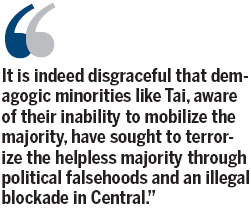The tyranny of the minority
Updated: 2013-10-10 07:15
By Chan Wai-keung(HK Edition)
|
|||||||
The 25th president of the United States, William McKinley, once said: "The tyranny of the minority is infinitely more odious and intolerable and more to be feared than that of the majority." Nothing is more apt to characterize the current Hong Kong political discourse than this adage. It is not the majority that dominates our discourse. Rather, it is the overbearing minority which misleads, humiliates, and tyrannizes the silent majority through falsehoods and distorted political concepts. A telling example is the stubborn defense of his so-called "Occupy Central" movement by Professor Benny Tai Yiu-ting.
Tai, probably dejected by the lukewarm public response to his "Occupy" initiative, recently wrote that not much blood has been shed in the struggle for democracy and justice in Hong Kong over the past few decades. Odder still, the vast majority of Hong Kong people were pilloried in his commentary for being self-seeking and loath to sacrifice themselves for democracy and justice.
Have the majority of Hong Kong people really been indifferent to social injustice and political dictatorship over the past decades as Tai suggested? Tai's contention is nothing but an insult to the sense of justice among Hong Kong people. He seems to have lost sight of the evolution of Hong Kong political history. In the late 1960s, so much local blood was shed in the fight against British autocratic rule. So many Hong Kong youngsters were imprisoned in their unremitting pursuit of social justice. Yet, the social injustice and colonial dictatorship in the 1960s no longer exist in today's Hong Kong. For most of the Hong Kong people, it indeed makes no sense nowadays to resort to violence in search of democracy.
Furthermore, the campaign for democracy launched by Tai, as my previous commentaries in this newspaper have noted, is ironically undemocratic and unrepresentative. One wonders whether or not thousands of participants in "Occupy" would be able to represent 7 million Hong Kong people in selecting the best universal suffrage proposal, and whether the interests of the minority - which approves of Tai's warped political notions - would undemocratically overwhelm those of the majority. It is therefore no wonder that the campaign initiated by Tai has yet to inspire the majority of Hong Kong people to sacrifice themselves and even shed their blood given its unrepresentativeness and exclusiveness.
Apart from misrepresenting the evolution of Hong Kong's political history, Tai also distorted the ethos of civil disobedience. "One who breaks an unjust law must do so openly, lovingly and with a willingness to accept the penalty". That was Martin Luther King Jr's definition of civil disobedience. Sadly, Tai never seems to have embraced that definition. He is indeed aware that many participants in his campaign would fear punishment for their unlawful actions. To dispel their fears, draw more people to his movement and, ultimately, create a false impression that his movement is espoused by the overwhelming majority, Tai, as a legal scholar, has ridiculously endorsed those who would form an illegal blockade in Central with impunity. As the campaign manifesto penned by Tai has made it clear, supporters of "Occupy" are allowed to "carry out acts of civil disobedience without giving up themselves to the authorities." An interesting question arises from Tai's distortion of the concept of civil disobedience: if the "Occupy" activists are really apprehensive about the fallout of legal judgment, why don't they just seek a legal means to vent their rage?
As Hao Tiechuan, director of publicity, cultural and sports affairs of the Liaison Office of the Central People's Government in the HKSAR, has rightly pointed out, "Occupy" activists should use lawful means to voice their political stances. They could hold rallies or demonstrations in accordance with the law to articulate their opposition to government policies. Unlawful means could be taken only after all legal means failed.
Have all legal means really failed? Are the traditional legal forms of demonstrations and rallies less powerful and threatening as Tai has always suggested? Of course not. The impact of traditional demonstrations and rallies on government decisions cannot be overstated. For instance, the march by half-a-million people in July 2003 prompted the Tung Chee-hwa administration to shelve the national security bill. Likewise, a rally led by students and parents outside government headquarters against the national education curriculum last year compelled a change in policy. Clearly, all legal means still works. The real reason why Tai jettisons traditional rallies and demonstrations in favor of an illegal means is his inability to appeal to the majority and, above all, to stage a large-scale demonstration comparable to that of 2003 on the basis of his minority views about politics.
It is indeed disgraceful that demagogic minorities like Tai, aware of their inability to mobilize the majority, have sought to terrorize the helpless majority through political falsehoods and an illegal blockade in Central. It is time for Hong Kong's silent majority to stand for its right and to mount a determined opposition to the "Occupy" fiasco.
The author is a lecturer at the College of Professional and Continuing Education, Hong Kong Polytechnic University.

(HK Edition 10/10/2013 page1)